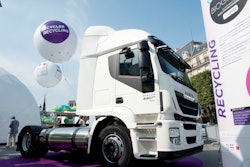Corporate executives, celebrities and scientists alike are campaigning in Paris this week for a momentous agreement to be ratified during the second half of the United Nations climate conference in Paris.
Representatives from some 195 countries are currently gathered in the French capital to negotiate a global climate deal intended to limit the increase in global temperatures to well below 2 C. Nevertheless, the post-2020 goals submitted by 155 countries representing almost 90% of global emissions will fall far short of what is needed to limit global warming to 2 C, according to a UN report, discussed in more detail by Bloomberg New Energy Finance (BNEF).
The ‘draft outcome’ of the COP21 talks gives shape to a deal set to be ironed out by the end of the week, which will formalize individual country pledges to cut emissions, establish a new carbon market mechanism and place a strong emphasis on differentiation. Of importance, a global review will take place every five years to assess rate of progress towards the collective long-term goal, with the first review scheduled for 2024.
The question of whether the US will adhere to President Barack Obama’s ambitious pledge to cut greenhouse gas emissions by 26 to 28% below 2005 levels by 2025, has been a recent sticking point at the event, with Republicans arguing that any deal needs to be ratified by the Senate, which their party controls. However, the pressure brought to bear by business leaders including Unilever, Kellogg and Goldman Sachs, all of whom are pledging to cut emissions in their operations, may influence the Republican stance more in favor of the new climate deal.
The voice of institutional investors and large corporates has been ever-present throughout the negotiations thus far. The New York State retirement fund announced it will shift $2bn of holdings away from high carbon-emitting entities, while Google completed deals to buy 781MW worth of output from solar and wind projects in the US, Chile and Sweden, and Morgan Stanley agreed to invest $100m in Massachusetts-based community solar farms.
Cities too, have been eager to take the lead in making tough pledges to cut pollution. Stockholm has set a goal to become fossil fuel-free by 2040, largely through green transportation and housing, while cities such as Beijing and Shenzhen are at the forefront of China’s mission to rapidly build out renewables – the Asian nation installed 30GW of wind and solar capacity last year alone, according to BNEF data.
Meanwhile, electric transportation is at the heart of the UK’s target to clean up its cities’ air — the country will invest GBP 600m ($906m) by 2020 to support electric vehicle take-up, reaffirming its support for the International Zero Emission Alliance, also adhered to by the Netherlands, Norway, Germany and eight US states.
In another announcement that coincides with COP21, the UK announced it will install more than 7m smart meters under a GBP 1bn program ($1.5bn) beginning next year – funded by the European Investment Bank and six other commercial banks.
Elsewhere in Europe, German utility RWE plans to triple its clean power investments to EUR 1bn annually, and to spin off its renewable, grid and retail operations into a new unit entitled NewCo. RWE will retain 90% of the new unit, while the remaining 10% will come to market via an IPO in late 2016. The new structure gives the utility the opportunity to expand further into renewables, but is fundamentally different to competitor E.ON’s decision to spin off its fossil fuel generation assets. Unlike E.ON, “RWE will not divest, meaning the company will remain an integrated utility. This also means that NewCo will be indirectly exposed to RWE’s performance and liabilities,” says the note RWE finds another way to spin, published by BNEF.
In related news, Spanish infrastructure company Acciona is preparing a potential IPO of its real-estate unit as it looks to delve further into the clean energy marketplace, capitalizing on increased interest in the sector and energy revenues that climbed 37% in the first nine months of the year to about EUR 2.1bn.
Also in Spain, renewable energy developer Abengoa will meet with its main creditor banks this week as it seeks to line up the necessary funds to pull it back from potential insolvency. Over the past few years, its aggressive growth plans --- raising finance to fund power transmission lines and solar projects from Brazil to India -- have cloaked the extent of debt the global engineering giant has been racking up. Abengoa's EUR 500m of bonds due in March have dropped more than 80% over the past month to be quoted at 16 cents on the euro. The company filed for preliminary creditor protection on 25 November, and has as much as four months to reach a debt agreement under Spanish bankruptcy law.


















